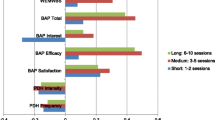Abstract
Despite the evidence supporting parenting programmes as a pathway to reduce and prevent childhood emotional and behavioural problems, these programmes still have low rates of uptake by families in the community. One way of increasing the participation rates of families in parenting programmes is to adopt a consumer's perspective to programme design and development. This study sought to examine whether grandparents providing regular care to their grandchildren viewed the strategies advocated in a parenting programme developed specifically for them as being acceptable and useful, and whether there were barriers to programme use. Forty-five grandparents, with an average age of 61.4 years (SD = 5.0), participated in the study. Grandparents provided between 11 and 20 h of care per week to their grandchildren, who were on average 4.5 years old (SD = 2.4), with the majority being boys (60 %). Results revealed that grandparents found the strategies promoted in the parenting programme highly acceptable and useful and were likely to use the strategies. Barriers to using specific strategies included time demands and belief that a specific strategy would not work. The implications of these findings are discussed within the context of consumer involvement in programme design and development.
Similar content being viewed by others
References
Arnold, D. S., O'Leary, S. G., Wolff, L. S., & Acker, M. M. (1993). The parenting scale: A measure of dysfunctional parenting in discipline situations. Psychological Assessment, 5, 137–144. doi:10.1037/1040-3590.5.2.137.
Australian Bureau of Statistics [ABS]. (2012). Childhood education and care, Australia, June 2011 (catalogue no. 4402.0). http://www.abs.gov.au/ausstats/abs@.nsf/Products/4402.0∼June+2011∼Main+Features∼Main+features?OpenDocument. Accessed 14 June 2012.
Backhouse, J., & Graham, A. (2010). Grandparents raising grandchildren: Negotiating the complexities of role-identity conflict. Child & Family Social Work, 17, 306–315. doi:10.1111/j.1365-2206.2011.00781.x.
Barer-Stein, T., & Kompf, M. (2001). The craft of teaching adults. Toronto: Irwin.
Barnett, M. A., Scaramella, L. V., Neppl, T. K., Ontai, L. L., & Conger, R. D. (2010). Grandmother involvement as a protective factor for early childhood social adjustment. Journal of Family Psychology, 24, 635–645. doi:10.1037/a0020829.
Biglan, A., Flay, B. R., Embry, D. D., & Sandler, I. N. (2012). The critical role of nurturing environments for promoting human well-being. American Psychologist, 67, 257–271. doi:10.1037/a0026796.
Borrego, J., & Pemberton, J. R. (2007). Increasing acceptance of behavioural child management techniques: What do parents say? Child & Family Behaviour Therapy, 29, 27–43. doi:10.1300/J019v29n02_03.
Coall, D. A., & Hertwig, R. (2010). Grandparental investment: Past, present, and future. Behavioral and Brain Science, 33, 1–59. doi:10.1017/S0140525X09991105
Collins, W. A., Maccoby, E. E., Steinberg, L., Hetherington, E. M., & Bornstein, M. H. (2000). Contemporary research on parenting: The case for nature and nurture. American Psychologist, 55, 218–232. doi:10.1037//0003-066X.55.2.218.
Colvin, A., Eyberg, S., & Adams, C. (1999). Restandardization of the Eyberg Child Behavior Inventory. Retrieved Febrary 3, 2013, from http://www.pcit.org.
Crawford, J. R., Cayley, C., Lovibond, P. F., Wilson, P. H., & Hartley, C. (2011). Percentile norms and accompanying interval estimates from an Australian general adult population sample for self-report mood scales (BAI, BDI, CRSD, CES-D, DASS, DASS-21, STAI-X, STAI-Y, SRDS, and SRAS). Australian Psychologist, 46, 3–14.
de Graaf, I., Speetins, P., Smit, F., de Wolff, M., & Tavecchio, L. (2008a). Effectiveness of the Triple P Positive Parenting Program on parenting: A meta-analysis. Journal of Family Relations, 57, 553–566. doi:10.1111/j.1741-3729.2008.00522.x.
de Graaf, I., Speetjens, P., Smit, F., de Wolff, M., & Tavecchio, L. (2008b). Effectiveness of the triple p-positive parenting program on behavioral problems in children: A meta-analysis. Behavior Modification, 32, 714–735. doi:10.1177/0145445508317134.
Dolbin-MacNab, M. L. (2006). Just like raising your own? Grandmothers' perceptions of parenting a second time around. Family Relations, 55, 564–575. doi:10.1111/j.1741-3729.2006.00426.x.
Eckert, T. L., & Hintze, J. M. (2000). Behavioural conceptions and applications of acceptability: Issues related to service delivery and research methodology. School Psychology Quarterly, 15, 123–148. doi:10.1037/h0088853.
Eyberg, S. M., & Pincus, D. (1999). Eyberg child behavior inventory and Sutter-Eyberg student behavior inventory—revised: Professional manual. Odessa: Psychological Assessment Resources.
Fergusson, E., Maughan, B., & Golding, J. (2008). Which children receive grandparental care and what effect does it have? Journal of Child Psychology and Psychiatry, 49, 161–169.
Francese, P. (2009). The grandparent economy: A study of the population, spending habits and economic impact of grandparents in the United States. http://assets.grandparents.com/legacy/binary-data/The-Grandparent-Economy-April-2009.pdf Accessed 14 June, 2012.
Goodfellow, J., & Laverty, J. (2003). Grandparents supporting working families: Satisfaction and choice in the provision of child care. Family Matters, 66, 14–19.
Halford, W. K., Markman, H. J., & Stanley, S. M. (2008). Strengthening couple relationships with education: Social policy and public health perspectives. Journal of Family Psychology, 22, 497–505. doi:10.1037/a0012789.
Hayslip, B., & Kaminski, P. L. (2005). Grandparents raising their grandchildren: A review of the literature and suggestions for practice. The Gerontologist, 45, 262–269.
Hayslip, B., & Patrick, J. (2003). Custodial grandparenting viewed from within a lifespan perspective. In B. Hayslip & J. Patrick (Eds.), Working with custodial grandparents (pp. 3–12). New York: Springer.
Hendricks, A. K. (2010). Changing roles: The pleasures of being a grandparent in New Zealand. A families commission report. http://www.oscarnetwork.org.nz/site/oscarnetwork/files/resources/FC-changing-roles.pdf Accessed 14 June 2012.
Heywood, E. (1999). Custodial grandparents and their grandchildren. The Family Journal: Counselling and Therapy for Couples and Families, 7, 367–372. doi:10.1177/1066480799074007.
Ireland, J. L., Sanders, M. R., & Markie-Dadds, C. (2003). The impact of parent training on marital functioning: A comparison of two group versions of the Triple P- Positive Parenting Program for parents of children with early-onset conduct problems. Behavioural and Cognitive Psychotherapy, 31, 127–142.
Jendrek, M. P. (1994). Grandparents who parent their grandchildren: Circumstances and decisions. The Gerontologist, 34, 206–216. doi:10.1093/geront/34.2.206.
Kazdin, A. E., & Blase, S. L. (2011). Rebooting psychotherapy research and practice to reduce the burden of mental illness. Perspectives on Psychological Science, 6, 21–37. doi:10.1177/1745691610393527.
Kirby, J. N., & Sanders, M. R. (2012). Using consumer input to tailor evidence-based parenting interventions to the needs of grandparents. Journal of Child and Family Studies, 21, 626–636. doi:10.1007/s10826-011-9514-8.
Lovibond, P. F., & Lovibond, S. H. (1995). The structure of negative emotional states: Comparison of the Depression Anxiety Stress Scales (DASS) with the Beck Depression and Anxiety Inventories. Behaviour Research and Therapy, 33, 335–343.
Minkler, M., & Fuller-Thomson, E. (1999). The health of grandparents raising grandchildren: Results of a national study. American Journal of Public Health, 89, 1384–1389.
Morawska, A., Sanders, M. R., Goadby, E., Headley, C., Hodge, L., McAuliffe, C., et al. (2011). Is the Triple P-positive parenting program acceptable to parents from culturally diverse backgrounds? Journal of Child and Family Studies, 20, 614–622. doi:10.1007/s10826-010-9436-x.
Nowak, C., & Heinrichs, N. (2008). A comprehensive meta-analysis of Triple P-positive parenting program using hierarchical linear modeling: Effectiveness and moderating variables. Clinical Child & Family Psychology Review, 11, 114–144. doi:10.1007/s10567-008-0033-0.
Ochiltree, G. (2006). The changing role of grandparents. Australian Family Relationships Clearing House, 2, 1–9.
Petch, J., & Halford, W. K. (2008). Psychoeducation to enhance couples' transition to parenthood. Clinical Psychology Review, 28, 1125–1137. doi:10.1016/j.cpr.2008.03.005.
Pittman, L. (2007). Grandmothers' involvement among young adolescents growing up in poverty. Journal of Research on Adolescence, 17, 89–116.
Prinz, R. J., & Sanders, M. R. (2007). Adopting a population-level approach to parenting and family support interventions. Clinical Psychology Review, 27, 739–749.
Rogers, E. M. (1995). Diffusion of innovations. New York: Free Press.
Rosenthal, D., & Moore, S. (2012). New age nanas: Being a grandmother in the 21st century. Newport: Big Sky Publishing.
Sanders, M. R. (2012). Development, evaluation, and multinational dissemination of the Triple P-positive parenting program. Annual Review of Clinical Psychology, 8, 1–35. doi:10.1146/annurev-clinpsy-032511-143104.
Sanders, M. R., & Kirby, J. N. (2011). Consumer engagement and the development, evaluation and dissemination of evidence-based parenting programs. Behavior Therapy, 43, 236–250. doi:10.1016/j.beth.2011.01.005.
Sanders, M., Markie-Dadds, C., & Turner, K. M. T. (2005). Every parents survival guide [DVD]. Brisbane: Triple P International.
Sanders, M. R., Markie-Dadds, C., Rinaldis, M., Firman, D., & Baig, N. (2007). Using household survey data to inform policy decisions regarding the delivery of evidenced-based parenting interventions. Child: Care, Health and Development, 33, 768–783.
Santucci, L. C., McHugh, K., & Barlow, D. (2012). Direct-to-consumer marketing of evidence-based psychological interventions. Behavior Therapy, 43, 231–235. doi:10.1016/j.beth.2011.07.003.
Smith, R. M. (1983). Learning how to learn: Applied learning theory for adults. Milton Keynes: Open University Press.
Smith, G. C., & Palmieri, P. A. (2007). Risk of psychological difficulties among children raised by custodial grandparents. Psychiatric Services, 58, 1303–1310. doi:10.1176/appi.ps.58.10.1303.
Smith, G. C., Palmieri, P. A., Hancock, G. R., & Richardson, R. A. (2008). Custodial grandmothers’ psychological distress, dysfunctional parenting, and grandchildren’s adjustment. International Journal Aging & Human Development, 67(4), 327–357.
Thomas, J. L. (1990). The grandparent role: A double bind. The International Journal of Aging and Human Development, 31, 169–177.
Thomas, R., & Zimmer-Gembeck, M. J. (2007). Behavioral outcomes of parent–child interaction therapy and Triple P-positive parenting program: A review and meta-analysis. Journal of Abnormal Child Psychology, 35, 475–495. doi:10.1007/s10802-007-9104-9.
Turner, K. M. T., Markie-Dadds, C., & Sanders, M. R. (2002). Facilitator's manual for group Triple P-revised edition. Brisbane: Triple P International.
Whittingham, K., Wee, D., Sanders, M. R., & Boyd, R. (2010). Responding to the challenges of parenting a child with cerebral palsy: A focus group. Disability and Rehabilitation, 1, 1–11. doi:10.3109/09638288.2010.535090.
Zubrick, S. R., Ward, K. A., Silburn, S. R., Lawrence, D., Williams, A. A., Blair, E., et al. (2005). Prevention of child behavior problems through universal implementation of a group behavioral family intervention. Prevention Science, 6, 287–304. doi:10.1007/s11121-005-0013-2.
Author information
Authors and Affiliations
Corresponding author
Rights and permissions
About this article
Cite this article
Kirby, J.N., Sanders, M.R. The Acceptability of Parenting Strategies for Grandparents Providing Care to Their Grandchildren. Prev Sci 15, 777–787 (2014). https://doi.org/10.1007/s11121-013-0428-0
Published:
Issue Date:
DOI: https://doi.org/10.1007/s11121-013-0428-0




